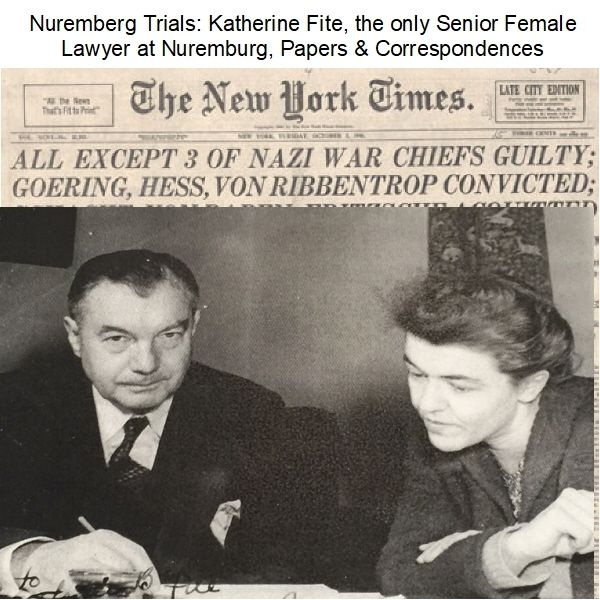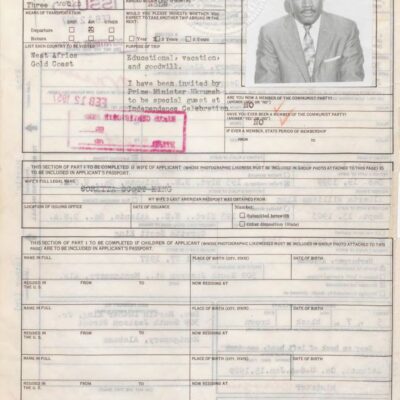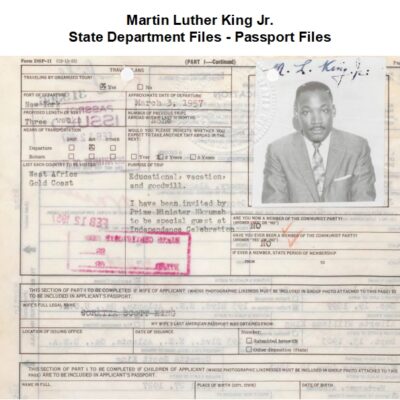
Nuremberg Trials-Katherine Fite, the only Senior Female Lawyer at Nuremberg, Papers & Correspondence
$19.50
Description
Katherine Fite’s Legal Career and the Nuremberg Trials
- 1905 (circa): Katherine Boardman Fite is born in Boston, Massachusetts.
- 1926: Katherine Fite receives her A.B. degree from Vassar College.
- 1930: Katherine Fite receives her LL.B. degree from Yale University Law School.
- 1934-1936: Katherine Fite works as an attorney for the General Claims Commission of the United States and Mexico.
- 1937: Katherine Fite begins working as the Assistant to the Legal Adviser at the U.S. Department of State.
- July 1945: Katherine Fite is assigned to the Office of the U.S. Chief of Counsel for the Prosecution of Axis Criminality, Nuremberg, Germany. This assignment is made shortly after the end of the war in Europe.
- Post-War Europe (London and Germany, immediately following the end of the war): Katherine Fite writes vividly descriptive letters to her parents, detailing her impressions of London and parts of Germany, her social life, and her work with the war crimes tribunal staff.
- Pre-Trial work (London): Katherine Fite participates in the London negotiations, which are part of the significant pre-trial work for the International Military Tribunal (IMT) at Nuremberg. She helps draft the Charter of the International Military Tribunal.
- Commencement of IMT Proceedings (Nuremberg): Katherine Fite is significantly involved from the beginning of the International Military Tribunal proceedings at Nuremberg. Her primary duty is to assist in the preparation of evidence and arguments for the trials of Nazi leaders.
- During the Nuremberg Trials: Katherine Fite helps interrogate defendants such as von Ribbentrop, Keitel, and Frick. She serves as an assistant to Justice Robert H. Jackson, the Chief United States Prosecutor. She also functions as a “political observer” of the proceedings.
- 1947: Katherine Fite writes “The Nuremberg Judgement A Summary by Katherine Fite,” a 36-page summary of the Tribunal’s judgment against the background of the Charter and Indictment.
- 1957: Katherine Fite marries Francis F. Lincoln, and subsequently uses the name Katherine Fite Lincoln.
- 1962: Katherine Fite Lincoln retires from service with the Department of State.
- 1989 (June 20): Katherine Fite Lincoln dies in or near Boston, Massachusetts.
- 2012: Professor Diane Marie Amann delivers the Katherine B. Fite Lecture at the 5th Annual International Humanitarian Law Dialogs in Chautauqua, New York. This lecture, later published as the paper “Politics and Prosecutions, from Katherine Fite to Fatou Bensouda,” examines the role of politics in international criminal justice, focusing on Fite’s career and the International Criminal Court.
Cast of Characters
- Katherine Boardman Fite (later Katherine Fite Lincoln): (Circa 1905 – June 20, 1989) A prominent American lawyer, born in Boston, Massachusetts. She received her A.B. from Vassar College and LL.B. from Yale University Law School. Fite served as an attorney for the General Claims Commission of the United States and Mexico and as Assistant to the Legal Adviser at the U.S. Department of State. Most notably, she was the only senior female lawyer at the Nuremberg Trials, where she assisted Justice Robert H. Jackson, helped prepare evidence and arguments, and interrogated defendants. She was also involved in drafting the Charter of the International Military Tribunal. After marrying Francis F. Lincoln in 1957, she retired from the Department of State in 1962.
- Justice Robert H. Jackson: The Chief United States Prosecutor of the Office of the United States Chief of Counsel for the Prosecution of Axis Criminality at the Nuremberg Trials. Katherine Fite served as his assistant.
- John Q. Barrett: A professor of Law at St. John’s University. He is quoted as recognizing Katherine Fite’s unique and significant participation “from the beginning” in the London negotiations, pre-trial work, and commencement of the International Military Tribunal proceedings at Nuremberg, noting her as the only female attorney involved in this capacity.
- Professor Diane Marie Amann: Chair in International Law at the University of Georgia School of Law. She authored the 2012 paper “Politics and Prosecutions, from Katherine Fite to Fatou Bensouda,” which was based on her Katherine B. Fite Lecture. Her work examines the intersection of politics and international criminal justice, using Fite’s career as a key example.
- Fatou Bensouda: Mentioned in the title of Professor Amann’s paper, she is the Prosecutor of the International Criminal Court whose transition in 2012 is discussed in the context of policy choices and the role of politics in international criminal justice.
- Francis F. Lincoln: The individual whom Katherine Fite married in 1957, after which she became known as Katherine Fite Lincoln.
- Von Ribbentrop: A defendant at the Nuremberg Trials who was interrogated by Katherine Fite. (Full name: Joachim von Ribbentrop, Nazi Germany’s Foreign Minister).
- Keitel: A defendant at the Nuremberg Trials who was interrogated by Katherine Fite. (Full name: Wilhelm Keitel, head of the German Armed Forces High Command).
- Frick: A defendant at the Nuremberg Trials who was interrogated by Katherine Fite. (Full name: Wilhelm Frick, Reich Minister of the Interior).
Nuremberg Trials: Katherine Fite, the only Senior Female Lawyer at Nuremburg, Papers & Correspondences
This collection contains a total of 379 pages.
Katherine Boardman Fite (later Katherine Fite Lincoln) was an assistant to Justice Robert H. Jackson, the Chief United States Prosecutor of the Office of the United States Chief of Counsel for the Prosecution of Axis Criminality, at the Nuremberg trials.
Fite’s primary duty was to assist in the preparation of evidence and arguments for use in the trials of Nazi leaders. At Nuremberg, she helped interrogate defendants von Ribbentrop, Keitel, and Frick. John Q. Barrett, professor of Law at St. John’s University, has written that, “the legal undertaking that was Nuremberg, however, only one female attorney participated, significantly and from the beginning, in the London negotiations, the pretrial work, and the commencement of the International Military Tribunal proceedings at Nuremberg.”
Katherine Fite Papers & Correspondences
Approximately 300 pages of material. This collection is chiefly composed of characterful and vividly descriptive letters that Fite wrote to her parents while in London and while engaged in her work at Nuremberg.
They give her impressions of London and parts of Germany in the months immediately following the end of the war in Europe; they describe too both the intimate and social sides of her life as a member of the war crimes tribunal staff, and the work that she performed while with this staff. It also includes a few of Fite’s travel papers and souvenirs.
Document Sources: Harry S. Truman Library: Katherine Fite Lincoln Papers
The Nuremberg Judgement A Summary by Katherine Fite
A 36-page 1947 summary written by Katherine Fite.
Abstract: The general definition of the crimes charged against the defendants at Nürnberg is contained in the Charter of the International Military Tribunal, which describes the Tribunal’s composition and jurisdiction. Particulars of the charges are set forth in the Indictment. The article below summarizes the Tribunal’s judgment against the background of the Charter and Indictment.
Politics and Prosecutions, from Katherine Fite to Fatou Bensouda
A 2012 paper written by Professor Diane Marie Amann, Chair in International Law at the University of Georgia School of Law.
Abstract: Based on the Katherine B. Fite Lecture delivered at the 5th Annual International Humanitarian Law Dialogs in Chautauqua, New York, this essay examines the role that politics has played in the evolution of international criminal justice. It first establishes the frame of the lecture series and its relation to IntLawGrrls blog, a cosponsor of the IHL Dialogs. It then discusses the career of the series’ namesake, Katherine B. Fite, a State Department lawyer who helped draft the Charter of the International Military Tribunal at Nuremberg and who was, in her own words, a “political observer” of the proceedings. The essay then turns to the the International Criminal Court, in which the first Prosecutor insisted that his was a “judicial” mandate wholly separate from politics. With an eye to transition this year, when a new Prosecutor will assume office, it considers how the ICC might work more effectively within the context of policy choices its officers make.
About Katherine Fite
Katherine Boardman Fite Lincoln was born ca. 1905 in Boston, Massachusetts. She received her A.B. degree from Vassar College in 1926 and her LL.B. in 1930 from Yale University Law School. From 1934 to 1936 she worked as an attorney for the General Claims Commission of the United States and Mexico. In 1937 she began work as the Assistant to the Legal Adviser at the U.S. Department of State. In July 1945 she was assigned to the Office of the U.S. Chief of Counsel for the Prosecution of Axis Criminality, Nuremberg, Germany. She married Francis F. Lincoln in 1957, and in 1962 retired from service with the Department of State. Lincoln died on June 20, 1989, in or near Boston, Massachusetts.
Related products
-

John F. Kennedy 1960 Presidential Election Campaign
$19.50 Add to Cart -

Viola Liuzzo Murder – Alabama KKK FBI Files – President Johnson Secret Phone Recordings
$19.50 Add to Cart -

American Revolution: British Political Cartoons
$19.50 Add to Cart -


Martin Luther King Jr. State Department Records – Passport Files
$3.94 Add to Cart